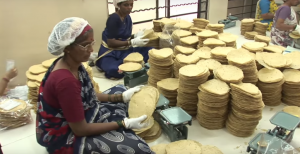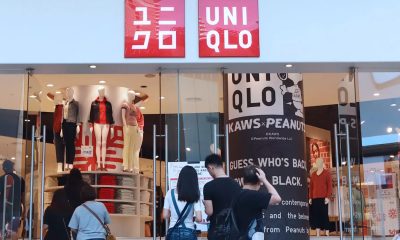Entrepreneur Stories
From 80 Rs To 6.5 Billion, Know The Success Story Of Lijjat Papad

Many of us enjoy rags to riches stories and we would all like to know how these people made their journey possible. The story of Lijjat Papad is one such story which is sure to leave you inspired throughout your life.
Today, Lijjat is more than a just a ‘papad’ (crispy bread) in Indian homes. It all started by getting a modest loan of just Rs.80 and now the company is tasting the stupendous success of more than Rs. 301 crores.
Shri Mahila Griha Udyog Lijjat was started in 1959 and at that time their only motto was empowering women by providing employment opportunities. This organization manufactures various products like Papad, Appalam, Gehu Atta, Masalas, Detergent powders, liquid detergents as well as detergent cakes.

The central office is located at Mumbai with 81 branches and 27 divisions spread across different states all over India. The main reason for its popularity is that the makers from past 40 years have been sticking to their core values.
The makers of Lijjat ensure that every process runs smoothly, every single person earns a comfortable profit, agents get their share and ultimately the consumers get quality products at an affordable rate.
This is how the team of Lijjat make it possible:
Every morning a group of women reach their workplace and knead dough which is then collected by another group of women to roll into papads. These women while coming to collect the dough also give the previous day’s production which is sent to quality testing. Another team packs the papads after the rolling is done.
Lijjat papad was all started when 7 women had an idea to start their own franchise by using their cooking skills and to make a living. These 7 women took a modest loan of Rs.80 from Chhaganlal Karamsi Parekh. They made the papads at their own building and started made it into a group venture with the help of their neighbors. Eventually, Lijjat became a household name known for quality papads.

With Chaganbapa’s advice, the women transformed this small venture into a cooperative and started recruiting women. During the first years, they had to stop the production of papads for almost 4 months due to rains. Later, they resolved this issue by buying a cot and a stove.
Lijjat papad later extended their productions to masala, khakhra, wheat atta as well as bakery items. To boost its sales, they started selling their items at trade fairs and exhibitions and also made advertisements to air on televisions. Eventually, they started attracting global interest which included the former Vice President of Uganda Dr. Speciosa Wandira-Kazibwe.
The makers of Lijjat papad follow the Sarvodaya philosophy. All the members are the owners of the company, which means profit or loss is equally shared among all the members. Every member has the power and authority to make their own decisions on their own initiative.
Today, Lijjat Papad is one of the most successful businesses that is owned by women for the empowerment of women. It helps women not willing to work outside their homes and contribute to their family incomes.
Entrepreneur Stories
Zupee Bolsters Short-Video Play with Vertical TV Acquisition Under INR 40 Cr

Delhi NCR-based gaming startup Zupee has acquired Mumbai-based microdrama platform Vertical TV in a deal valued under INR 40 Cr. This move strengthens Zupee Studio, its short-video arm launched in September 2025, by integrating Vertical TV’s expertise in bite-sized dramas like romance and thrillers.
Facing challenges from India’s 2025 real-money gaming ban, Zupee valued at $1 Bn after raising $120 Mn has pivoted to non-gaming content, including recent layoffs of 40% of its workforce. The acquisition builds on its November 2025 purchase of Australian AI firm Nucanon for interactive storytelling, targeting its 200 Mn+ users with engaging, mobile-first formats.
This deal underscores the rising microdrama trend in India, helping Zupee diversify amid regulatory pressures and compete in the short-video space dominated by quick, shareable content for on-the-go audiences.
Videos
T.N. Seshan: The Fearless Reformer Who Redefined Indian Democracy

T.N. Seshan’s name stands tall in India’s history as the man who transformed the nation’s electoral system with extraordinary courage and integrity. Born in 1932 in Kerala, Seshan grew up with values of discipline, education, and service to the nation — virtues that shaped his illustrious journey. From his early brilliance at Madras Christian College to his advanced studies in public administration at Harvard University, Seshan’s path reflected rare determination and intellect. Joining the Indian Administrative Service in 1955, he built a reputation as a no‑nonsense officer committed to efficiency and honesty, serving in key roles such as Secretary of Defense and overseeing vital national programs.
As the Chief Election Commissioner of India in 1990, T.N. Seshan sparked a new era of electoral integrity. In a system once marred by corruption, violence, and malpractice, Seshan brought order, fear, and respect through his groundbreaking reforms. He introduced voter ID cards, imposed strict spending limits on campaigns, and insisted on transparency at every level of the election process. Despite criticism from political circles that labeled him dictatorial, his relentless pursuit of fairness empowered every citizen to vote fearlessly. Under his leadership, the Election Commission became a symbol of strength and integrity in Indian democracy.
Seshan’s passing in November 2019 marked the end of an era, but his message continues to resonate across generations. Leaders from every corner of the country mourned the loss of the man who restored faith in free and fair elections. His enduring legacy reminds us that true leadership lies not in wielding power, but in serving people with honesty, courage, and conviction. T.N. Seshan’s life remains a timeless inspiration a reminder that democracy thrives only when its citizens are vigilant, responsible, and fearless.
Entrepreneur Stories
Indian Man Quits JPMorgan, Takes 70% Pay Cut to Launch $6 Million Startup

Leaving behind a high-paying job at JPMorgan, an Indian entrepreneur embraced a 70% salary cut to pursue true purpose and passion in the startup world. Disenchanted with what he described as a “robotic” corporate routine, he sought meaningful work that made a real impact. This pivotal decision marked the beginning of his new journey, one focused on value creation rather than titles and corporate perks.
Powered by resilience and fresh perspective, the entrepreneur launched his own startup, prioritizing innovation and hands-on solutions. The road was challenging, but his vision resonated with the market: the startup quickly gained traction and raised $6 million—an impressive acknowledgement of its potential in a competitive landscape. Every hard lesson from early setbacks and bootstrapping paid off in real customer growth and investor confidence.
Today, his journey stands as an inspiring example for professionals seeking authentic success outside the corporate grind. By trading comfort for creative freedom, he grew a venture that solves important problems, generates jobs, and builds wealth beyond just salary. For ambitious founders, his story highlights the power of risk-taking, adaptability, and relentless focus on impact in India’s thriving startup ecosystem.












Ubvwiqbb
May 26, 2025 at 3:28 pm
Explore the ranked best online casinos of 2025. Compare bonuses, game selections, and trustworthiness of top platforms for secure and rewarding gameplaycasino bonus.
irotdlyjz
July 18, 2025 at 8:47 pm
Com volatilidade alta-média, este jogo concederá pagamentos com um pouco menos de frequência, mas com vitórias mais amplas em média. Há opções em diferentes categorias na Esportiva Bet, incluindo game shows, poker, bacará, blackjack e jogos asiáticos como Bac Bo. A casa também oferece mais de 50 mesas VIP para quem busca algo mais sofisticado. Não é atoa que a série Big Bass se tornou um verdadeiro estandarte da cultura iGaming. Big Bass Bonanza, o jogo originário da série, é um jogo do pescador com bons gráficos, rodadas grátis empolgantes com a funcionalidade de multiplicadores e de jogabilidade simples. Gire os slots demo da Pragmatic Play agora no DemoSlotsFun. Sem cadastro, sem limite — só caos puro e giro nervoso. Tá esperando o quê? Vai atrás do ouro com o John Hunter, explode docinho com o Sugar Rush, ou encara o pescador raiz do Big Bass Bonanza. Qualquer que seja o rolê, a Pragmatic tem um jogo pronto pra te viciar.
http://snowcrunch.com/videos/13976-sweet-bonanza-da-pragmatic-play-uma-analise-detalhada-para-jogadores-do-brasil
O prêmio máximo no Big Bass Bonanza é 2.100 vezes o valor da sua aposta total. Independente do premio máximo, os resultados dos jogos são imparciais e justos, portanto, defina um limite e jogue apenas por diversão. O Big Bass Bonanza é um jogo de caça-níqueis cativante e bem projetado, oferecendo uma combinação perfeita de diversão e possíveis recompensas. Com seus gráficos vibrantes e uma mecânica de jogo envolvente, ele se destaca no mercado de slots. O prêmio máximo no Big Bass Bonanza é 2.100 vezes o valor da sua aposta total. Independente do premio máximo, os resultados dos jogos são imparciais e justos, portanto, defina um limite e jogue apenas por diversão. Big Bass Bonanza é, sem dúvidas, um dos slots mais populares entre os jogadores, aparecendo frequentemente em listas de destaques devido ao seu alto potencial de prêmios.
rjjakenvj
July 22, 2025 at 12:46 pm
Like the sound of Mission Uncrossable, but don’t want to chance signing up at Roobet? Don’t worry as we’re here to show you how you can play some similar games at Stake.us from most US states. The further you advance, the higher your rewards, but beware—one wrong move and it’s game over! Do you have what it takes to master the mission? Unlike typical mission-based games that focus solely on tasks, Mission Uncrossable weaves a compelling story. Players are immersed in a narrative filled with betrayal, resistance networks, and hidden truths. Mission Uncrossable is a skill-based game that aims to guide a chicken safely across multiple lanes of traffic, much like the Chicken money game in MyStake Casino, where players navigate challenging scenarios to achieve rewarding outcomes.. Here’s a breakdown of how to play and the rules:
https://gilteclocacoes.com.br/chuck-chicken-game-surfaces-but-is-it-anything-like-the-original/
Big Buffalo Megaways gets its stampede on when using any device, offering stakes from 20 p c to $ €250. While the theme and gameplay are standard, the math model might prove an attraction for certain people. Medium volatile, the RTP is 96.5%, with no mention of whether engaging the ante bet or buying free spins alters the figure in any way. As for the gameplay, every time you hit the play button, 2 to 7 symbols land on each of the 6 reels, producing up to 117,649 ways to win. Seemingly everybody wants a go at the Buffalo franchise, and given that Buffalo King Megaways is a revival of an older game rather than an original concept, it gives Pragmatic Play the perfect motive to jump on the Buffalo Train yet again. If you’re looking to up the ante in your game, Buffalo King Megaways has just the feature for you. The Ante Bet Feature allows players to double their chances of triggering free spins, for an additional 25% spin cost. This is activated by switching the feature on from the wooden plaques on the left of the reels.
Kuwin
November 5, 2025 at 11:38 am
kuwin sở hữu kho game đa dạng từ slot đến trò chơi bài đổi thưởng, mang đến cho bạn những giây phút giải trí tuyệt vời.
GO88
November 10, 2025 at 5:27 pm
Tham gia cộng đồng game thủ tại Go88 để trải nghiệm các trò chơi bài, poker phổ biến nhất hiện nay.
ios超级签
November 10, 2025 at 9:47 pm
苹果签名,苹果超级签平台,ios超级签平台ios超级签苹果企业签,苹果超级签,稳定超级签名
iwin
November 12, 2025 at 2:11 am
iwin – nền tảng game bài đổi thưởng uy tín, nơi bạn có thể thử vận may và tận hưởng nhiều tựa game hấp
J88
November 15, 2025 at 5:54 am
Đến với J88, bạn sẽ được trải nghiệm dịch vụ cá cược chuyên nghiệp cùng hàng ngàn sự kiện khuyến mãi độc quyền.
MM88
November 16, 2025 at 1:38 pm
Khám phá thế giới giải trí trực tuyến đỉnh cao tại MM88, nơi mang đến những trải nghiệm cá cược thể thao và casino sống động.
MM88
November 22, 2025 at 7:36 pm
Với giao diện mượt mà và ưu đãi hấp dẫn, MM88 là lựa chọn lý tưởng cho các tín đồ giải trí trực tuyến.
GGBet Casino Erfahrungsbericht
December 21, 2025 at 7:31 am
Die mobile Version des Casinos bietet dieselben umfassenden Funktionen wie die
Desktop-Version, ohne Kompromisse bei der Qualität einzugehen. Goldenstar Casino ermöglicht seinen Spielern einen bequemen und
flexiblen mobilen Zugriff, sodass sie jederzeit und überall auf ihre Lieblingsspiele zugreifen können.
Goldenstar Casino setzt sich aktiv für den Schutz seiner Spieler
ein und bietet zahlreiche Ressourcen, um sicherzustellen, dass das Spielen verantwortungsvoll und sicher bleibt.
Regelmäßige Sicherheitsupdates und strenge
Protokolle sorgen dafür, dass die Plattform stets auf dem neuesten Stand ist
und eine sichere Spielumgebung bietet. Das VIP-Programm von Goldenstar Casino
bietet eine Reihe von exklusiven Vorteilen, die mit jeder höheren Stufe attraktiver werden.
Spieler sammeln bei jedem Einsatz Treuepunkte, die später gegen Boni, Freispiele
oder andere attraktive Belohnungen eingetauscht werden können.
Gleichzeitig bietet das System Schutz vor ungewollten Ausgaben und fördert verantwortungsbewusstes Spielen.
So profitieren Nutzer von schnellen, sicheren und
transparenten Zahlungsabläufen, die das Spielerlebnis komfortabel gestalten. Die Verwendung von Kryptowährungen ermöglicht zudem anonyme
und besonders sichere Transaktionen im Golden Star Casino online.
Spieler können Einzahlungen und Golden Star Casino auszahlung schnell und unkompliziert durchführen. Darüber hinaus gewährleistet das Casino durch seine benutzerfreundliche Zahlungsplattform eine einfache Handhabung für alle Nutzer.
References:
https://online-spielhallen.de/casino-venlo-mobile-app-ihr-spielerlebnis-unterwegs/
top gambling sites australia
December 26, 2025 at 7:14 pm
By grabbing a welcome bonus, you can get free money and free spins, so you’ll have more opportunities
to win. Playing at low bets is the way to go if you are a newbie to online gambling.
Alternatively, you can make transactions in cryptocurrencies, which some of the
best Aussie casinos accept.
Our game evaluations are a great resource for learning about the rules and techniques of the games you’re interested in playing.
The two parties will discuss putting as many games online as feasible.
It refers to companies that create and sell casino games.
References:
https://blackcoin.co/no-verification-casinos-in-australia-the-ultimate-guide/
solana gambling site
December 27, 2025 at 3:40 pm
Among the live games, blackjack and roulette are most often chosen where
you may view the cards being dealt and the roulette wheel spinning in real time.
Ongoing promotions such as weekly reloads, free spins, high-roller bonuses, and
no-deposit offers keep the excitement going. Richard Casino delivers
on speed, payment variety, and fairness, making it
a reliable choice for most players. This
full assessment will evaluate the unique features of this casino in the very competitive online
gaming environment.
It’s a nice way to stretch your bankroll for those weekend gaming sessions.
Use code WEEKEND with a minimum A$45 deposit
and you’re away. The weekend reload bonus gives you a 50% boost up to
A$500 every Saturday and Sunday. Make a deposit of A$50 or
more using code FS50 and you’ll snag 50 free spins.
One thing that caught our attention during this Richard
Casino review was the bonus buy feature available on select slots.
References:
https://blackcoin.co/casino-basics/
kor.fromkorea.kr
December 29, 2025 at 1:09 pm
paypal casino uk
References:
kor.fromkorea.kr
https://classifieds.ocala-news.com/author/jerefawcett
December 29, 2025 at 1:25 pm
casino mit paypal
References:
https://classifieds.ocala-news.com/author/jerefawcett